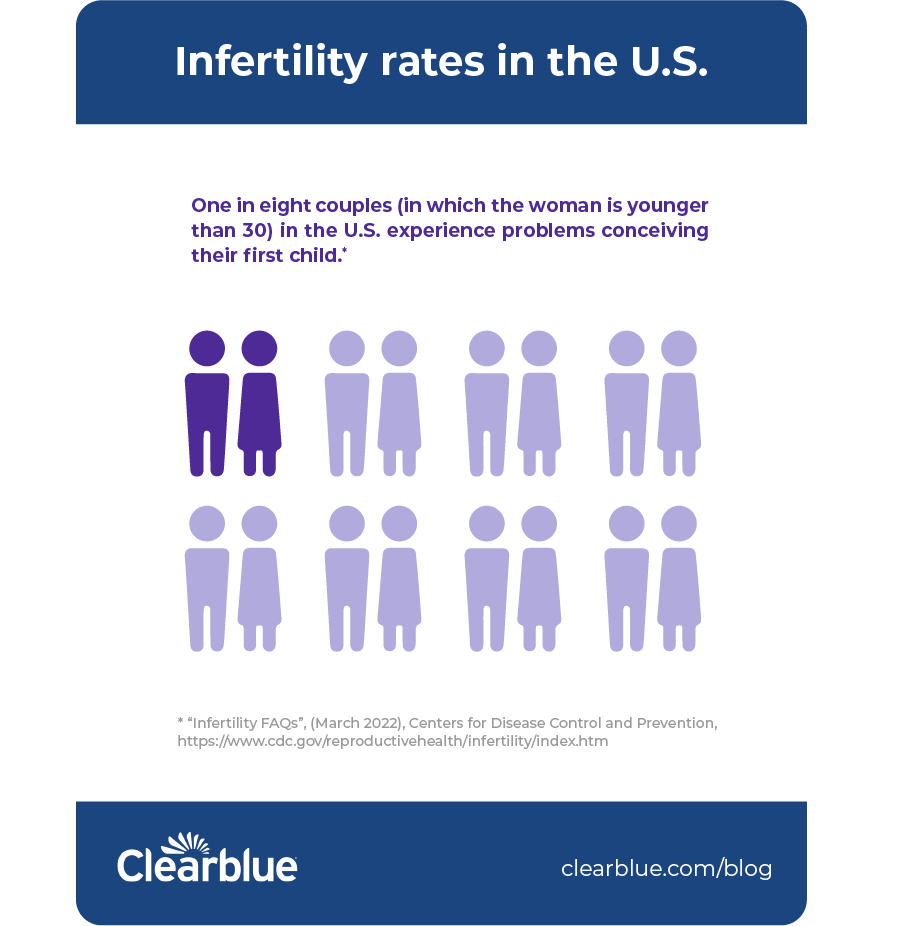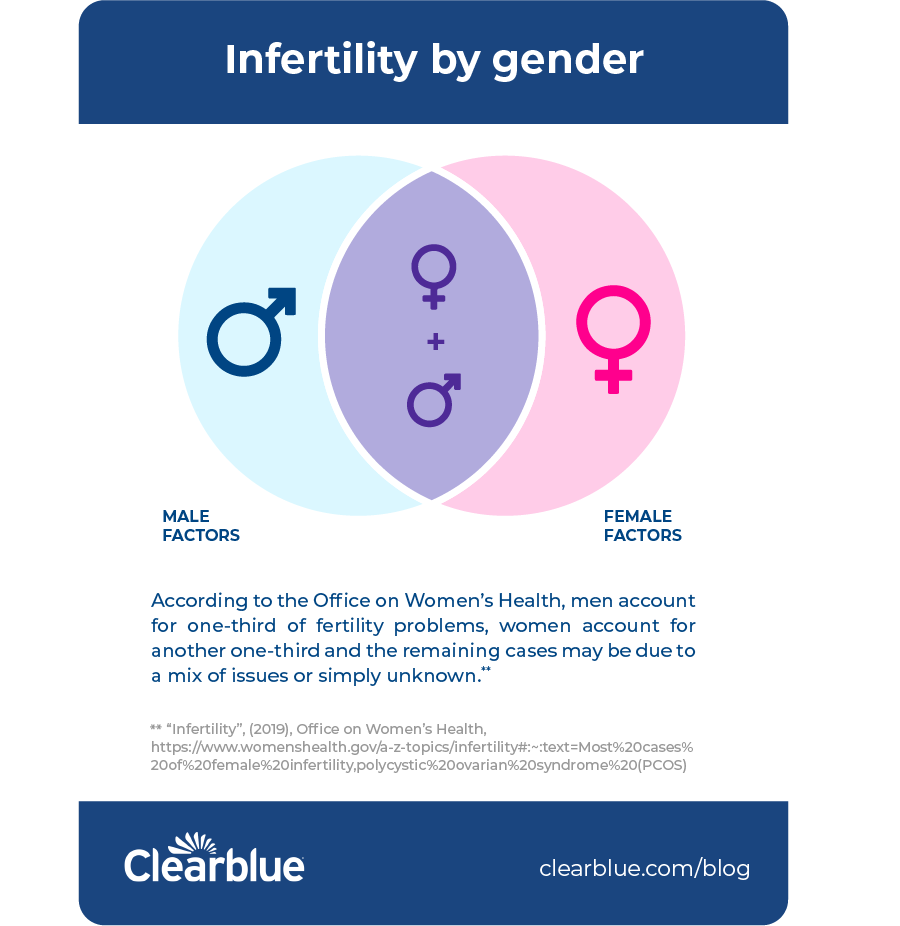Secondary infertility: What it is, why it happens and how to cope

You’ve already had one child (or more), but for some reason, you’re struggling to get pregnant again. Odds are, you’re feeling frustrated and extremely confused as to why you carried a healthy pregnancy to term in the past, but now you and your partner are having trouble conceiving. You just want answers so your vision for your family can become a reality.
Infertility is actually categorized by primary and secondary infertility. Primary infertility is when a pregnancy has not been achieved within one year of trying to conceive by a couple, and secondary infertility is when at least one prior pregnancy has been achieved.1 Many people are aware of primary infertility, but secondary infertility can be just as devastating. Let’s learn more about what it means for many hopeful parents.
What is secondary infertility?
As the name might imply, secondary infertility is when someone is unable to conceive a child or carry a pregnancy to full term after previously giving birth. To classify as secondary infertility, the previous birth must have occurred without help from fertility medications or treatments, like in vitro fertilization (IVF).2 This may occur after someone has just one child, or multiple.

How common is secondary infertility?
Unfortunately, secondary infertility is just as common as primary infertility.2 One in eight couples (in which the woman is younger than 30) in the U.S. experience problems conceiving.3 Despite the similarities with primary infertility, secondary infertility can be more upsetting because you have already had at least one child in the past without issues or aid from fertility treatments.
What causes secondary infertility?
Like primary infertility, there are a handful of potential causes for secondary infertility, for both men and women. According to the Office on Women’s Health, men account for one-third of fertility problems, women account for another one-third and the remaining cases may be due to a mix of issues or simply unknown.4

Here are some of the causes of infertility in men, in women and a few that happen in both men and women:
Causes of secondary infertility in women:
- Failure to ovulate
- Problems with menstrual cycle
- Structural problems of the reproductive system
- Infection
- Failure of an egg to mature properly
- Endometriosis or autoimmune disorders 5
- Age (fertility declines with age primarily because egg quality declines over time)3
Causes of secondary infertility in men:
- Disruption of testicular or ejaculatory function
- Trauma to the testes
- Cancer treatment that affects one or both testicles
- Medical conditions such as diabetes, cystic fibrosis, certain types of autoimmune disorders and certain types of infections
- Hormonal disorders
- Genetic disorders3
Causes of secondary infertility that can affect women or men:
- Smoking
- Excessive alcohol use, steroid use or illicit drug use
- Being overweight or underweight
- Extreme weight gain or loss
- Exposure to environmental pollutants and toxins1
When should I talk to a doctor?
See your doctor if you’re under 35 and have been trying to conceive for 12 months. If you’re over 35 and have been trying to conceive for six months, reach out to your doctor. And if you’re over 40, contact your doctor right as you start trying to conceive. This applies to both primary and secondary infertility. If you have any specific concerns or health issues — like the ones listed above — it’s worth having a preemptive conversation with your doctor. You might also consider methods to help boost your fertility health at home.
If you think you’re dealing with secondary infertility, you may worry that your feelings or symptoms are being disregarded since you were previously able to conceive. “Keep on trying” is good advice in theory, but if you strongly believe something is wrong, don’t be afraid to advocate for your health and needs or seek a second opinion.
Treatment options for secondary infertility
Infertility can be treated with medicine, surgery, artificial insemination, assisted reproductive technology (ART), surrogacy or a combination of methods.4 Finding which options are right for you and your partner should be a collaborative effort with your doctor. They’ll run through the benefits, risks and side effects of each.
The sad reality is that people experiencing secondary infertility often receive far less social support than those going through primary infertility, simply because they have already had at least one successful pregnancy. You might start to feel like your grief and frustration are invalid — but they aren’t. You can recognize your thankfulness for your existing family while also acknowledging the deep desire for more children. Because secondary infertility is just as common as primary infertility, plenty of hopeful parents have gone through the same thing. Finding emotional support is just as crucial as finding medical help.
It’s easy to dwell on the question “Will I ever get pregnant again?”. Those worries are valid. Connecting to a community where you can find understanding, comfort and solidarity will help reiterate the truth: You are not alone in your infertility journey.
Source
- “Infertility”, (2020), World Health Organization, https://www.who.int/news-room/fact-sheets/detail/infertility
- “Secondary Infertility”, (June 2020), Cleveland Clinic, https://my.clevelandclinic.org/health/diseases/21139-secondary-infertility
- “Infertility FAQs”, (March 2022), Centers for Disease Control and Prevention, https://www.cdc.gov/reproductivehealth/infertility/index.htm
- “Infertility”, (2019), Office on Women’s Health, https://www.womenshealth.gov/a-z-topics/infertility#:~:text=Most%20cases%20of%20female%20infertility,polycystic%20ovarian%20syndrome%20(PCOS)
- “What are some possible causes of female infertility?”, (2017), Eunice Kennedy Shriver National Institute of Child Health and Human Development, https://www.nichd.nih.gov/health/topics/infertility/conditioninfo/causes/causes-female




